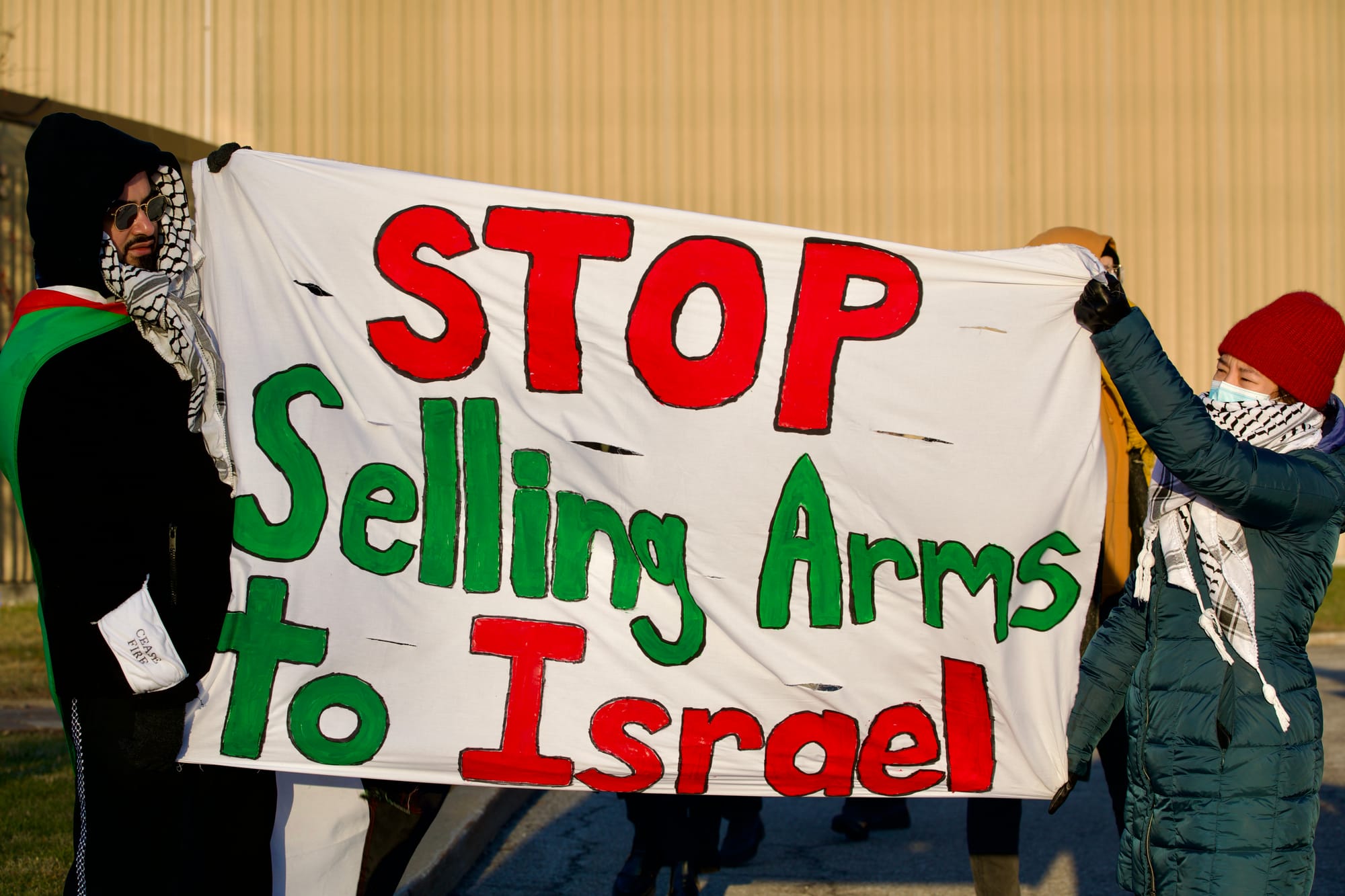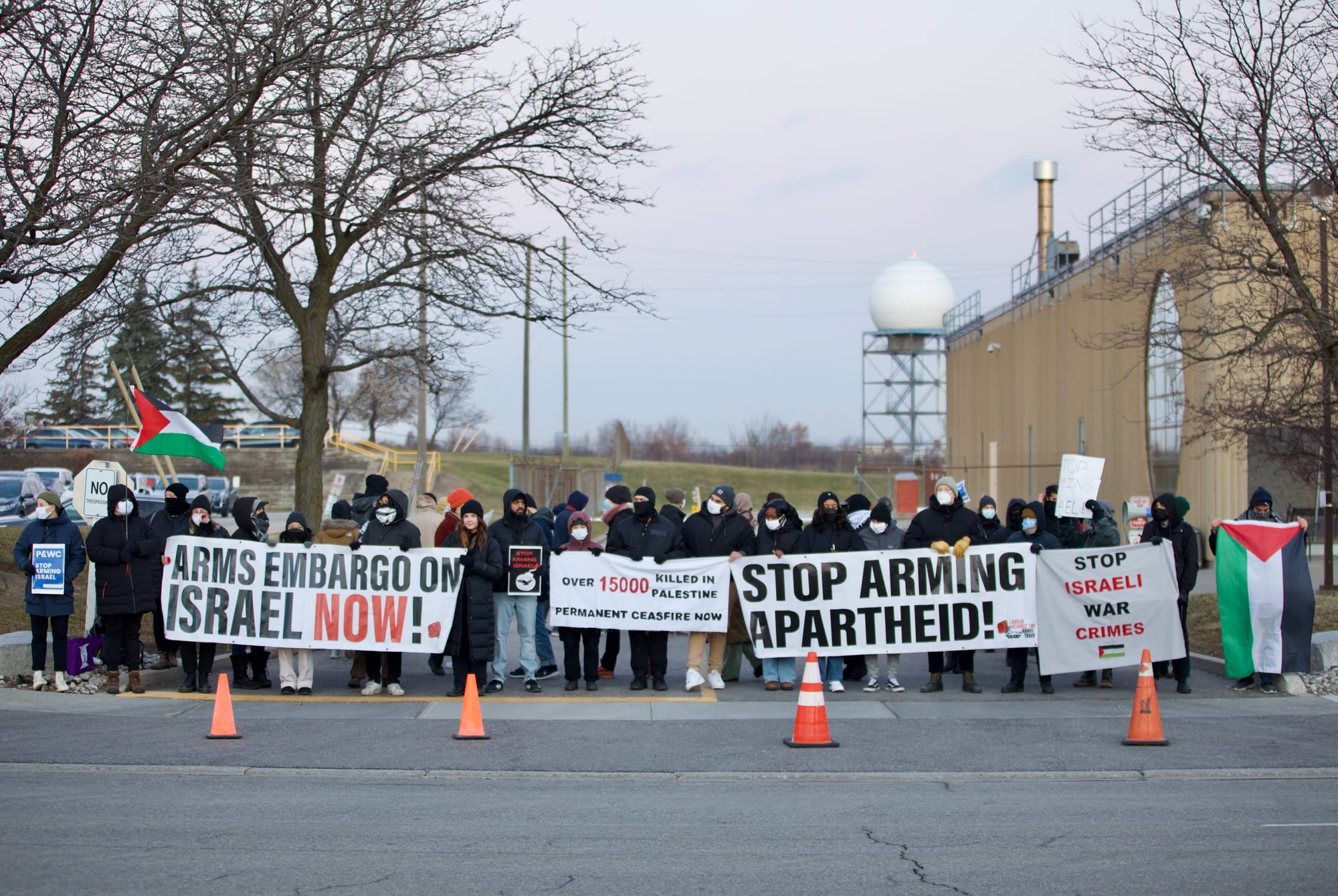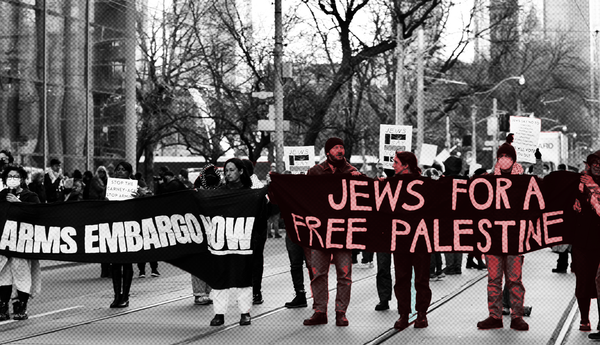Approximately 200 workers and union members from across the GTA blocked the arrival of the morning shift at the Mississauga plant of military contractor Pratt & Whitney Canada (PWC) and called on the Canadian government to stop arms exports to Israel.
The Tuesday protest was jointly organized by World Beyond War, Labour for Palestine and Labour Against the Arms Trade.
The protesters gathered in front of the factory before the PWC employees arrived at 7:30 a.m. The protesters held banners reading “Stop Arming Apartheid” and “Arms Embargo on Israel Now.”
“We are not going to allow companies right here in our city to arm Israeli war crimes and to profit from the Israeli military’s violence,” Rachel Small, an organizer with World Beyond War, told The Maple. “We are here to hurt their bottom line.”

PWC is a branch of its American parent company, which itself is a subsidiary of the Virginia-based RTX Corporation (formerly Raytheon). In 2015, Pratt & Whitney’s American operation announced it had secured a 15-year contract to service the engines of the Israeli air force’s fleet of F-15 and F-16 fighter jets.
In a statement, World Beyond War noted that those planes are currently bombing Gaza, and said that “Pratt & Whitney Canada makes the engines that power [Israeli Aerospace Industries]’s Heron TP (Eitan) UAVs. Israel uses the drones for airstrikes, surveillance, and target acquisition.”
Small said that her organization will not allow PWC to operate normally while it manufactures arms and other supplies for Israel, which has killed around 8,000 Palestinian children in Gaza over the past two months.
A report from Al Jazeera broadcast on Wednesday said that Palestinian women, children and babies were killed execution style by Israeli forces while they sheltered inside the Shadia Abu Ghazaleh school in northern Gaza, according to eyewitnesses.
“[Arms companies] cannot continue to act as though they are not complicit in genocide,” Small said.
Some demonstrators chanted for a ceasefire in Gaza while another group turned away the workers’ cars and factory trucks from the facility’s entrance.
No Sign Of Arms Embargo
Canada voted for a UN General Assembly motion calling for an immediate ceasefire in Gaza on Tuesday, but has so far provided no indication that it plans to stop arms exports to Israel while its bombing campaign and ground operations rage on.
Canadian military exports to Israel were valued at more than $21 million last year. However, the federal government provides little information about the exact kinds of goods being sold, and arms monitoring groups typically rely on press releases from military suppliers themselves for specific information about what Canadian-made equipment is ending up in the Israeli military’s hands.
A report published by the arms monitoring group Project Ploughshares this week warned that some Canadian-made components, including those found in F-35 fighter jets, are first shipped to the United States and then ultimately supplied to the Israeli military. Israel has used F-35s in its bombing of Gaza.
“Given the substantial risk that Canadian military goods could contribute to [possible war crime] abuses in Gaza, Canada must immediately halt all transfers of weapons to Israel,” the report said.
Canada is bound by the Arms Trade Treaty (ATT) and Export and Import Permits Act (EIPA) to stop military exports if there is a substantial risk the goods could be used to violate human rights or international law.
After Israel launched its assault on Gaza, a group of Palestinian trade unions and professional associations called on their counterparts around the world to take urgent action to stop arming Israel.
“We are calling on trade unions in relevant industries to refuse to build weapons destined for Israel, to refuse to transport weapons to Israel [...] to pressure governments to stop all military trade with Israel, and in the case of the U.S., funding to it,” a group called Workers In Palestine said on its website.
World Beyond War has published a list of some military contractors with a presence in Canada that are involved in arming the Israeli military. In recent weeks, Canadian protesters picketed some of those companies, including INKAS, L3 Harris, Lockheed Martin, ZIM and Geo-Spectrum Technologies.
Some Employees Supportive
The protesters at Tuesday’s demonstration distributed flyers to PWC employees to inform them about their company’s relationship with Israel.
Aidan Macdonald, a member of Labour for Palestine, was one of the protesters talking to the employees as they tried to drive into the facility. Macdonald said many factory labourers were supportive of the protest, and were quoted as saying they agreed with the protesters’ demands.
“It has been nice to see that reaction,” Macdonald said.

Small said that as a parent of two young children, she felt compelled to take action. “If the Canadian government will not stop the flow of weapons to Israel [...] then those of us with a moral conscience are forced to take whatever actions we can to stop the genocide,” said Small.
Activist Anna Willats has been participating in Palestine solidarity protests since October 7.
“If we can keep doing this right across the country on a regular basis, these companies are going to see the effect on their bottom line, and hopefully then we can get some action from our government,” Willats said.
After four hours, the protesters left the facility peacefully and said they would continue the protests until a permanent ceasefire is established.
Nur Dogan is a Turkish-Canadian freelance journalist and photojournalist who covers stories for New Canadian Media.







